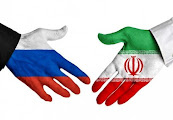"The leadership of both countries pay priority
attention to the development of trade and economic ties. Growth of mutual trade
in 2023, despite a certain decline, totaled over US$4.0 billion.
We recorded growth of 12.4% as of the end of January -
August. The share of national currencies in mutual payments ws over 96%,"
the press service informed.
Russia and Iran are implementing several large-scale mutual
projects in the sphere of transport and energy, the Kremlin said. The
North-South international transport corridor project is being developed.
Russian-Iranian relations are on the rise, the press service noted.
According to the Islamic Republic of Iran Customs
Administration (IRICA), the value of Iran’s non-oil exports to Russia rose 12%
in the first six months of the current Iranian calendar year as compared to
last year’s first half.
According to the IRICA data, Iran exported 1.3 million tons
of commodities worth over US$494 million to Russia in the first half of the
current Iranian year.
Non-oil exports to the Russian Federation also increased by
20% in terms of weight.
In the first half of the current Iranian year, foreign
transit through Iran from Russia reached 526,000 tons with a growth of 17%, and
foreign transit to Russia was 56,000 tons, which decreased by 18%.
The Islamic Republic had exported 2.2 million tons of
commodities worth US$965 million to Russia in the previous Iranian calendar
year, which also registered a 54% increase in weight and a 28% rise in value.
The main Iranian products exported to Russia in the previous
year were fresh or dried pistachios, ordinary non-expandable polystyrene, fresh
kiwi and synthetic fibers, and other types of polyester.
Iran and Russia have been taking serious steps to boost
their mutual trade over the past few years.
In late January, Iran’s late President Ebrahim Raisi said
that the Islamic Republic and Russia have reached an agreement to boost the
trade between the two countries up to US$10 billion.
“We agreed to remove trade barriers and boost the economic
exchanges between the two countries. Currently, the level of mutual trade is
not acceptable, so the two countries agreed to increase trade to US$10 billion
a year,” Raisi said on January 21, upon arrival to Tehran after a two-day visit
to Moscow.
He also noted that the two sides also discussed monetary and
banking issues during his talks with Russian officials.
The two countries also agreed to identify mutual
agricultural capacities as well as suitable areas for the exchange of
agricultural products in order to increase the level of trade in the
agricultural sector, according to the official.
He went on to say that the Islamic Republic of Iran has very
good capacities in the field of transit and transportation, saying: “During
this visit, it was agreed to activate the north-south corridor. This transit
route will make the time and distance of transiting goods from Russia and
different northern countries to the southern regions much shorter.”






